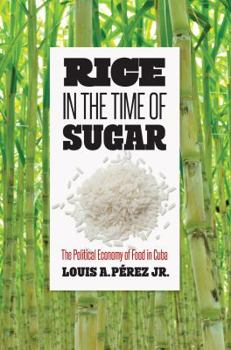Rice in the Time of Sugar: The Political Economy of Food in Cuba
How did Cuba's long-established sugar trade result in the development of an agriculture that benefited consumers abroad at the dire expense of Cubans at home? In this history of Cuba, Louis A. P rez proposes a new Cuban counterpoint: rice, a staple central to the island's cuisine, and sugar, which dominated an export economy 150 years in the making. In the dynamic between the two, dependency on food imports--a signal feature of the Cuban economy--was set in place.
Cuban efforts to diversify the economy through expanded rice production were met with keen resistance by U.S. rice producers, who were as reliant on the Cuban market as sugar growers were on the U.S. market. U.S. growers prepared to retaliate by cutting the sugar quota in a struggle to control Cuban rice markets. P rez's chronicle culminates in the 1950s, a period of deepening revolutionary tensions on the island, as U.S. rice producers and their allies in Congress clashed with Cuban producers supported by the government of Fulgencio Batista. U.S. interests prevailed--a success, P rez argues, that contributed to undermining Batista's capacity to govern. Cuba's inability to develop self-sufficiency in rice production persists long after the triumph of the Cuban revolution. Cuba continues to import rice, but, in the face of the U.S. embargo, mainly from Asia. U.S. rice growers wait impatiently to recover the Cuban market.
Cuban efforts to diversify the economy through expanded rice production were met with keen resistance by U.S. rice producers, who were as reliant on the Cuban market as sugar growers were on the U.S. market. U.S. growers prepared to retaliate by cutting the sugar quota in a struggle to control Cuban rice markets. P rez's chronicle culminates in the 1950s, a period of deepening revolutionary tensions on the island, as U.S. rice producers and their allies in Congress clashed with Cuban producers supported by the government of Fulgencio Batista. U.S. interests prevailed--a success, P rez argues, that contributed to undermining Batista's capacity to govern. Cuba's inability to develop self-sufficiency in rice production persists long after the triumph of the Cuban revolution. Cuba continues to import rice, but, in the face of the U.S. embargo, mainly from Asia. U.S. rice growers wait impatiently to recover the Cuban market.
Format:Hardcover
Language:English
ISBN:1469651416
ISBN13:9781469651415
Release Date:May 2019
Publisher:University of North Carolina Press
Length:264 Pages
Weight:1.29 lbs.
Dimensions:0.8" x 6.1" x 9.2"
Customer Reviews
0 rating





